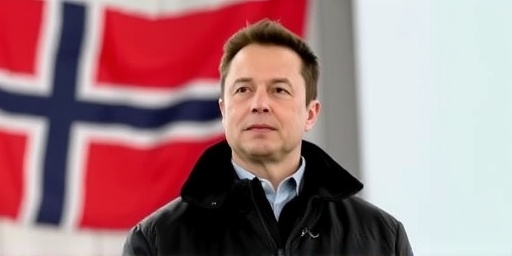In a significant blow to Elon Musk’s ambitious compensation plans, Norway’s sovereign wealth fund has become the first major institutional investor to publicly oppose the Tesla CEO’s proposed $1 trillion pay package. This rejection, announced ahead of Tesla‘s upcoming shareholder vote, underscores growing concerns over executive pay in the electric vehicle giant, potentially influencing other investors to follow suit.
Norway’s Ethical Investment Stance Challenges Musk’s Rewards
Norway’s Government Pension Fund Global, one of the world’s largest sovereign wealth funds with assets exceeding $1.5 trillion, has long been a vocal advocate for ethical and sustainable corporate governance. Managed by Norges Bank Investment Management (NBIM), the fund holds a stake in Tesla valued at approximately $2.5 billion, making it a key player in the company’s shareholder base. On Wednesday, NBIM issued a statement citing excessive risk and misalignment with shareholder interests as reasons for voting against the pay package.
“While we recognize Elon Musk’s pivotal role in Tesla’s success, this compensation structure raises serious questions about proportionality and long-term value creation,” said NBIM Chief Executive Officer Nicolai Tangen in the official release. The fund’s decision aligns with its broader policy of scrutinizing executive remuneration that could dilute shareholder value or encourage short-termism. Norway’s investor approach has previously led to divestments from companies like Walmart over labor issues, and this move signals a similar rigor applied to tech leaders like Musk.
The opposition comes at a critical juncture for Tesla, which has faced scrutiny over Musk’s influence since his 2018 pay package—valued at up to $56 billion—was voided by a Delaware court in January 2024. That ruling prompted Tesla to propose an even more expansive deal, tying Musk’s rewards to ambitious market capitalization and operational milestones. Critics, including Norway’s fund, argue that the new package, potentially worth $1 trillion if all performance goals are met, far exceeds industry norms and could entrench Musk’s control at the expense of broader governance.
Unpacking the $1 Trillion Tesla Pay Package Proposal
Elon Musk’s proposed pay package at Tesla is nothing short of audacious, structured as a stock-option grant that vests only upon achieving extraordinary performance targets. Unveiled in June 2024, the plan requires Tesla to hit escalating market caps—from $1 trillion to as high as $10 trillion—alongside revenue and EBITDA goals over a decade. If successful, it would grant Musk shares representing about 20% of Tesla’s equity, valued at over $1 trillion based on current stock prices hovering around $250 per share.
This isn’t Musk’s first rodeo with controversial compensation. His 2018 package, which propelled Tesla’s valuation from $50 billion to over $1 trillion at its peak, was lauded for driving innovation but later criticized for lacking oversight. The Delaware Chancery Court’s decision to rescind it highlighted issues of conflicted board decisions, with the judge noting Musk’s “unfathomable” influence. Tesla’s response was to relocate its incorporation to Texas and relaunch the pay package with minor tweaks, aiming to reapprove it via shareholder vote in 2025.
Proponents, including Musk himself, defend the package as essential for retaining visionary leadership. “Tesla’s future depends on bold incentives,” Musk tweeted last month, emphasizing how similar structures have fueled the company’s growth from a niche EV maker to a global powerhouse with 2024 deliveries projected at 1.8 million vehicles. However, data from proxy advisory firms like Glass Lewis and ISS shows that such mega-packages are rare; the median CEO pay at S&P 500 companies was $16.3 million in 2023, per Equilar.
Norway’s rejection amplifies voices from shareholder advocacy groups like the Council of Institutional Investors, which has urged members to vote no, citing risks of overcompensation amid Tesla’s recent challenges, including a 20% stock drop in 2024 due to softening EV demand.
Tesla Stock Volatility Amid Investor Backlash
Tesla’s shares dipped 3% in after-hours trading following Norway’s announcement, reflecting investor jitters over the pay package’s fate. The electric automaker’s stock has been a rollercoaster, surging 700% in 2023 on AI and autonomy hype before correcting sharply this year. Analysts attribute much of the volatility to Musk’s distractions, including his role at xAI and political endorsements, which some fear could alienate customers in key markets like Europe.
“This opposition from a heavyweight like Norway could snowball,” said Wedbush Securities analyst Dan Ives, who maintains a bullish stance on Tesla but warns of governance risks. Ives noted that institutional investors control over 40% of Tesla’s shares, and coordinated pushback might force revisions. Indeed, pension funds from California and the Netherlands have echoed similar sentiments in private filings, though Norway’s public stance sets it apart.
From a financial perspective, Tesla’s fundamentals remain robust. The company reported $25.2 billion in Q2 2024 revenue, up 2% year-over-year, driven by energy storage growth and Cybertruck ramp-up. Yet, profit margins squeezed to 5.5% due to price cuts, prompting questions about whether Musk’s pay should scale with such pressures. Bloomberg data indicates Tesla’s enterprise value at $800 billion, meaning the pay package could consume a significant portion if triggered, potentially sparking dilution fears among retail investors who idolize Musk.
- Key Stock Metrics Post-Announcement: Tesla (TSLA) closed at $248.42, down 1.2% intraday.
- Market Cap Impact: Potential $25 billion swing if opposition intensifies.
- Peer Comparison: GM and Ford CEOs earned under $30 million in 2023, highlighting the disparity.
The investor community’s division is evident on platforms like Reddit’s r/teslainvestorsclub, where debates rage over Musk’s value versus compensation excess. Norway’s move may galvanize retail holders, who own about 40% of shares, to scrutinize the ballot.
Corporate Governance Debates Fueled by Musk’s Tesla Dominance
The controversy surrounding Elon Musk’s pay package extends beyond dollars to the heart of corporate governance in Silicon Valley. Tesla’s board, stacked with Musk allies like his brother Kimbal and long-time confidante Ira Ehrenpreis, has faced accusations of lacking independence. The 2018 package’s approval, for instance, involved a “special committee” that met just twice, per court documents—a point Norway’s fund highlighted in its opposition letter.
Experts in executive compensation, such as Pearl Meyer consultant Brian Gifford, argue that while performance-based pay can align interests, Musk’s deal borders on the unprecedented. “It’s like rewarding the captain before the ship reaches port,” Gifford told Reuters, pointing to clauses allowing repricing if targets slip. This flexibility, critics say, undermines the merit-based intent.
Norway’s investor ethos, rooted in the country’s oil-funded ethical investing mandate, contrasts sharply with Tesla’s freewheeling culture. The fund’s stewardship report for 2023 engaged with over 900 companies on pay issues, voting against 12% of proposals deemed excessive. For Tesla, this includes pushing for diversity on the board, where women hold only two of eight seats.
Globally, the saga resonates amid rising scrutiny of tech CEOs. Meta’s Mark Zuckerberg earns $1 in salary but vast stock grants, while Amazon’s Andy Jassy received $212 million in 2023. Yet Musk’s potential trillion-dollar haul dwarfs these, prompting SEC filings from activist investors like Ross Gerber of Gerber Kawasaki, who owns $2 million in Tesla and calls the package “insane.”
In Europe, where Norway leads, regulators like the EU’s Sustainable Finance Disclosure Regulation are tightening rules on executive pay transparency. Tesla’s compliance could become a flashpoint, especially as it expands Gigafactories in Berlin and Shanghai.
Looking Ahead: Shareholder Vote and Tesla’s Strategic Path
As Tesla gears up for its annual shareholder meeting in early 2025, Norway’s opposition could tip the scales in what promises to be a contentious vote. The company needs a majority of disinterested shares to approve the pay package, excluding Musk’s own 13% stake and those of insiders. With institutional holders like Vanguard and BlackRock yet to declare, the outcome remains uncertain—but momentum against it is building.
If rejected, Musk has hinted at alternatives, such as spinning off xAI or seeking external funding for his ventures, which could divert focus from Tesla’s core EV and autonomy goals. Analysts project Tesla reaching 20 million annual deliveries by 2030, but only if leadership stability persists. A revised package, perhaps capped at $100 billion, might emerge as a compromise.
For Norway’s sovereign wealth fund, this stance reinforces its role as a global governance watchdog, potentially influencing votes at peers like Apple and Google. As electric mobility accelerates, with Tesla commanding 50% U.S. market share, the pay debate will shape how investors balance innovation rewards with accountability. Stakeholders now watch closely, as the verdict could redefine executive incentives in the AI and EV era.
In the broader landscape, this episode highlights Tesla’s evolution from disruptor to establishment player, where Musk’s genius meets the realities of public markets. Whether the pay package passes or pivots, it will undoubtedly fuel ongoing discussions on leadership compensation in high-growth tech firms.








